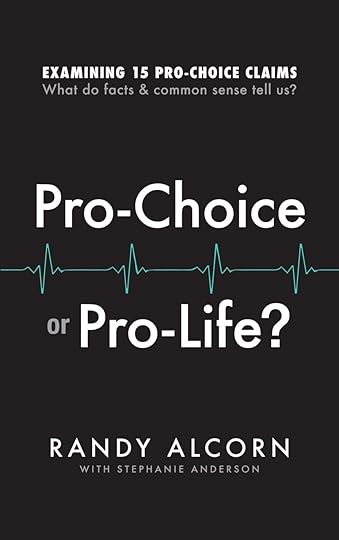Randy Alcorn's Blog, page 52
July 18, 2022
Should We Say, “This World Is Not Our Home”?

We’ve probably all heard it said, “This world is not our home.” I used to say it, too. It’s true, but it’s a half truth. We should qualify it to say, “This world—as it now is, under the Curse—is not our home.” But we should also say, “This world—as it once was, before sin and curse—was our home.” And we should add, “This world—as it one day will be, delivered from the Curse—will be our home.”
Often we think of Heaven as our going up into an angelic realm to live with God in His place. But in fact, the Bible says the ultimate Heaven will be God coming down from His place to live with us in our place—the New Earth.
I share more in this video:
Let’s never fall for the devil’s lie that the physical universe is evil—God is the one who created it, who made us to live in it and desires us to rule over it forever for His glory! He will not annihilate the universe; He will reverse the Curse and refashion the universe to His glory. The Carpenter from Nazareth is a builder of worlds and a repairer of worlds. Both we and the Earth are in desperate need of repair. And that is His promise. Everything that is broken, including us, He will fix.
For more on the New Earth, see Randy’s book Heaven . You can also browse our resources on Heaven and additional books.
Photo by Dave Hoefler on Unsplash
July 15, 2022
She Was Like a Tree Planted by Water

Thanks to everyone for your kind words and for your prayers over the last few months. I am still dealing with the physical and mental fatigue of grief, but there is progress, and I am grateful for it. Above all, I’m experiencing the peace and friendship of Jesus, and I’m so grateful not only for His Lordship, but His companionship.
Nanci and I always said that Jesus was our best friend, and we were each other’s second best friend. Now my second best friend is with my best friend, but my best friend is still here with me. “And behold, I am with you always” (Matthew 28:20). “Never will I leave you; never will I forsake you” (Hebrews 13:5). His presence helps me put one foot in front of the other, not with sense of drudgery, but with a sense of gratitude and comfort, knowing He is with me and is giving me strength.
Jeremiah 17:7-8 was Nanci’s go-to Scripture during her four years of cancer: “Blessed is the one who trusts in Yahweh, whose confidence is in him. They will be like a tree planted by the water that sends out its roots by the stream. It does not fear when heat comes; its leaves are always green. It has no worries in a year of drought and never fails to bear fruit.”
I’ve been reflecting on how powerfully I saw that passage displayed in her life. During all the years I knew Nanci, she was devoted to Jesus. But something wonderful happened in her last four years. In her walk with God, her view of God, and her trust in God she mentored and discipled me. I watched her life in ways no one else could, day by day. (You can’t fool the person you live with!) I saw up close her diligence in reading and meditating on God’s Word, reading great books, and writing in her journals, which she would sometimes read to me.
I saw the reality of Jeremiah 17 in her life:
like a tree planted by water,
that sends out its roots by the stream
Every morning Nanci read Scripture, Spurgeon, The Valley of Vision (a book of Puritan prayers), Paul Tripp’s New Morning Mercies, and books by J. I. Packer, A. W. Tozer, and John Piper. She placed herself by the stream of God’s Word and great books, and she sent her roots deep.
and does not fear when heat comes,
for its leaves remain green
Nanci always cared for the plants and flowers around our house. I watered them during her illness, and under her direction they thrived. Likewise, she was careful to attend to her soul’s thirst. She wrote in her journal, “Trials/sufferings/‘heat’ will come—even to believers—but those who draw their sustenance from the LORD—‘the stream’—will not only survive; they will flourish.”
and is not anxious in the year of drought
for it does not cease to bear fruit
When Nanci sometimes felt anxious, she instructed herself by God’s Words, and the anxiety was replaced by peace and hope and rest in the great God she knew to be her Father, and the Jesus she knew not only as Savior and Lord, but friend. And WOW—she bore more fruit than ever before!
Nanci wrote, “Needing to trust in Christ, and then choosing to do so, results in Him making a home deeper in my heart. My trust allows my soul to continuously grow in the presence of God’s love for me. It is a deep and marvelous love.”
I am overwhelmed with gratitude to God—not just for what He did in our healthy years, but especially for what He did in our last four years together. It was a wonder to behold. I had a front row seat—THE front row seat—and it was far more compelling and ultimately triumphant than any sporting event or concert or rally.
God did a miracle of grace and empowerment in Nanci’s heart that far exceeds physical healing, and through her afflictions He achieved in her an eternal weight of glory that far outweighs them all. I saw the miracle of my wife’s last years. She praised Jesus for it, and I will forever praise Him for it.
Photo by kien virak from Pexels
July 13, 2022
The Art of Arguing Well: Six Strategies for Winning the Abortion Debate Without Losing Your Opponent

Note from Randy: In this article, Mike Spencer, author of Humanly Speaking: The Evil of Abortion, the Silence of the Church, and the Grace of God, gives us six pieces of advice for when we’re talking about abortion with others. His advice is especially applicable to our cultural conversations in light of the Supreme Court’s recent decision in Dobbs v. Jackson Women’s Health.
I met Reagan on a flight home from a speaking engagement. After a few friendly questions, I discovered that he had married two years earlier, worked for the United States Air Force, and was returning from a business trip.
Our conversation lapsed, but about twenty minutes before our plane landed, I noticed Reagan had closed his book, so I asked another question. Eventually, he asked about my work. I explained that I advocate for the unborn threatened by abortion, as well as for their mothers facing unplanned pregnancies. Without skipping a beat, he responded, “I lean toward the pro-choice position. Tell me why I should be pro-life.” I answered, “Well, actually, you shouldn’t be pro-life if the science of human embryology is wrong.” Reagan’s curiosity was piqued, and we launched into a meaningful dialogue by focusing our discussion on the question at the heart of the abortion debate, “What are the unborn?” Before long, we had an audience as the passengers in the two rows in front of us didn’t even pretend not to be listening.
As the plane landed, Reagan surprised me with another direct question: “Thirty years of marriage? What’s your secret?” I answered, “Reagan, there’s no secret. My wife and I are convinced Jesus Christ is who He claimed to be. We’ve built our lives on this truth, and it has made all the difference in our marriage.” I have no idea what lasting impact, if any, my words had on him or our extended audience. But God knows, and I trust Him to use my words for His purposes.
I confess this was a conversation I could not have had 20 years ago. At that time, I lacked both the knowledge and the skill to navigate through thorny subjects like abortion without my passions getting the better of me. In my earlier years I meant well, but it is possible to have the right answers and the right motivation but the wrong approach. The apostle Paul must have had this in mind when he wrote, “Be wise in the way you act toward outsiders; make the most of every opportunity. Let your conversation be always full of grace, seasoned with salt so that you may know how to answer everyone” (Colossians 3:5-6).
Here are six simple strategies that will help you win the abortion debate without losing, or alienating, your audience.
Strategy #1: Take an honest interest in others.
With the noteworthy exception of public pro-life events and displays designed to create public dialogue, generally the most effective way to start one-on-one conversations about abortion is to talk about other things and simply look for natural openings. With Reagan, I did not set out to have a conversation about abortion. However, by expressing an honest interest in his life, a door of opportunity opened.
I’ve found that people are very interested in discussing abortion but are more inclined to do so when they know our care for them is genuine and not a sneaky sales tactic. If we are not careful, our burden for the unborn (or any theological, political, social, or moral topic) can blind us relationally, causing us to view family, friends, and strangers as targets rather than as people. (As my conversation with Reagan demonstrated, defending the unborn and sharing the gospel are not competing interests. Doing the first often presents the opportunity to do the second.)
Strategy #2: Attack arguments, not people.
Preaching the gospel repeatedly brought Jesus’ disciples face-to-face with hostile opponents. They undoubtedly felt the urge to lash out, to respond sarcastically, and to portray their antagonists unfairly. But they didn’t. Paul wrote, “Christ’s love compels us” (2 Corinthians 5:14). What a powerful example. Clever tactics and good apologetic arguments are vitally important, but arguing well on behalf of the unborn has to begin with love. We must resist the temptation to attack or demonize those with whom we disagree.
However, loving and respecting people does not mean loving and respecting their opinions. Some ideas are so bad and so dangerous that we are duty-bound to expose them: “We demolish arguments and every pretension that sets itself up against the knowledge of God” (2 Corinthians 10:5). When an idea or argument justifies killing innocent human beings, defeating it becomes our calling.
This isn’t an easy balance. If we are motivated by anything less than Christ’s love, the worst in them will bring out the worst in us.
Strategy #3: Define “winning” the abortion debate from a biblical perspective.
Winning does not necessarily mean having your pro-choice friend on his knees renouncing his pro-abortion position. There is freedom in recognizing that our part is simply to “make the most of every opportunity,” to be sure our conversations are “always full of grace and seasoned with salt,” and then to trust God for the results. Understanding this helps take the pressure off. Treat your opponents in such a way that if they visit your church and sit in the pew next to you, you will have nothing for which to apologize.
Strategy #4: Stay focused on the unborn and stay out of the weeds.
Perhaps you have noticed that abortion supporters want to talk about anything and everything except the unborn child. They talk about a woman’s “right to choose,” a broken foster-care system, hard-case scenarios like rape and incest, and a litany of other secondary issues. While these topics deserve our attention, none of them has anything to do with the moral question of abortion.
Even though many pro-choice people would have us believe abortion is a complicated matter, Scott Klusendorf lays out the pro-life argument with clarity:
Premise 1: It is morally wrong to intentionally kill an innocent human being.
Premise 2: Abortion intentionally kills an innocent human being.
Conclusion: Abortion is morally wrong.
So keep the unborn front-and-center in your conversations or you will end up in the tangled weeds of red herrings, empty slogans, and misleading clichés.
Strategy #5: When appropriate, be the one to end the conversation.
We have all encountered well-intentioned pro-lifers whose zeal blinded them to normal social graces, causing others to avoid them like the plague. Being the one to end the conversation in situations where you are likely to have future opportunities to revisit the topic can be particularly helpful. When people know they can leave a conversation, they feel free to stay with it or to return to it at another time.
Strategy #6: Keep in mind that the world is watching you.
Although we shouldn’t be consumed with an unhealthy need to be liked or accepted, we should nevertheless care deeply about how we are perceived. We represent another King and another Kingdom: “We are Christ’s ambassadors as though God were making His appeal through us” (2 Corinthians 5:20). When it comes to conversations about abortion, what we say and how we say it can have life and death consequences for our tiniest neighbors. This should cause us to be on our best behavior, “so that in every way” we “will make the teaching about God our Savior attractive” (Titus 2:10).
Unfortunately, many of our adversaries have painted us as belligerent, religious know-nothings bent on oppressing women. And much of our public discourse over morality and politics has decayed into a snarky game of “gotcha” where civility and diplomacy are sacrificed on the altar of winning at all costs. But the command to “Make the most of every opportunity” is not about scoring points or crushing people; it is about finding ways to argue our case persuasively, with kindness.
Remember, “Gracious words are a honeycomb, sweet to the soul and healing to the bones” (Proverbs 16:24). We should ask ourselves, “What is in my heart? Do I value crushing my enemies more than winning them over?” A little kindness goes a long way in developing the type of trust that invites greater and more meaningful dialogue.
Photo by Gerrie van der Walt on Unsplash
July 11, 2022
Satan Has Vested Interests in Making Unbelievers Think They Are Going to Heaven

I’ve read many accounts of experiences in which people who do not know Christ claim to have gone to Heaven, or its outskirts, and were reassured by a “being of light” that all is well with them. I’m convinced that though some have had real supernatural experiences, the one who reassured them was not Jesus. Obviously, Satan has great vested interests in deceiving unbelievers into thinking that what awaits them after death is a place of serenity rather than of eternal punishment. Scripture says, “Even Satan disguises himself as an angel of light” (2 Corinthians 11:15).
Years ago, one of my friends, a trustworthy and credible doctor, recounted an experience that really disturbed him. He observed a patient who appeared very close to dying have terrifying and inconsolable visions of where he was about to go upon his death. He actually recovered, but when the doctor attempted to share the gospel with him, the man remembered his dreadful experience as a wonderful dream of Heaven. This incident wound up as a story thread in my novel Dominion:
Clarence called Ollie from the hospital to update him on his father.
“You won’t believe this,” Ollie said. “Norcoast is in the hospital. He attempted suicide.”
“What? Which hospital?”
“Right where you’re calling from—Emanuel.”
Clarence went to the front desk to get Norcoast’s room number. He’d just been moved off critical condition and out of ICU but was still under close monitoring. Clarence went to his room on the fourth floor and stood over him. The councilman was drained of color, pale and pasty. Unconscious, he lay very still. Clarence stood over him for ten minutes before Norcoast started to move. He shuddered and trembled. He started mumbling, appearing to be seeing things and hearing voices.
“O God, they’re trying to get me.” Clarence backed away from the tortured voice. “Monsters, demons attacking me.” His arms flailed. “It’s so hot. Hurts so bad. No. Stay away. Don’t hurt me.” After a few minutes of incoherence, he calmed down a little, then spoke again, eyes closed. “Gone now. Where is everybody? I’m so alone. I’m burning up! Help me!” He screamed out, writhing, soaking himself in sweat, casting the sheets to his side and bumping against the bedrails. Two nurses ran into the room.
Clarence backed out of the room, shaken. He went directly to the hospital chapel and prayed fervently for his father, but even more fervently for Reggie Norcoast.
The next morning Clarence came early to the hospital, first visiting his father, who was unconscious. Then he went up two floors to visit Norcoast. The door was closed. A nurse told him the councilman had had terrible hallucinations all night, but he was now awake and out of trouble.
Clarence peeked in the door. Norcoast, usually vibrant and healthy, looked pale and peaked, like a man who’d been through a wringer. Clarence knocked lightly on the doorframe.
“Hello, Reg, can I come in?”
“Clarence?” Norcoast looked down. “I can’t tell you how sorry I am about Esther and Gray and everything.” He lay there looking dejected and pathetic. Clarence pitied him.
“Reg, I need to talk to you about some things. I know I’ve never talked with you about my faith before, but I feel it’s—”
“Clarence, something wonderful happened last night.” Norcoast suddenly sounded euphoric. “I was just about to die—in fact I think I may have died, really. I was walking down this shining corridor and there was this magnificent angel of light. It was so beautiful. The angel assured me there’s a special place in heaven for me. He said I just needed to get in touch with myself, live a good life, and do the best I could to love others. It was so real. I was on the verge of heaven, and I didn’t want to come back. But I realize I was sent back for a reason. To tell people about God’s love and acceptance.”
Clarence looked at him, slack-jawed. “Reg, I was here last night. I heard you crying out to God and screaming and talking about demons attacking you. You felt like you were on fire, then you talked about being all alone. You weren’t on the verge of heaven. You were on the verge of hell!”
“What are you talking about?” Norcoast said. “No, you’ve got it all wrong. I remember it clearly. A bright angel, a beautiful home, peaceful feelings. Serenity. It was the most wonderful place I’ve ever been. The most extraordinary experience I’ve ever had. I’ve lost so much that’s dear to me in the last few days, but this is a great comfort. I’ve made contact with my angel now. Esther says eventually I’ll learn to talk to him and get his guidance.”
Clarence stared at him, at a complete loss for words.
Let’s pray for the unbelievers in our lives, that God will open their eyes and “grant them repentance leading them to the knowledge of the truth” (2 Timothy 2:25).
See the booklets and tracts available from our ministry, including Heaven, If God Is Good, and Are You Living the Good Life?
Photo by Markus Spiske on Unsplash
July 8, 2022
If We Fear God, We Can Trust His Provision

There are people who reason, If I give generously, I’ll have to worry about where the money will come from to replace what I’ve given. But Jesus actually says the opposite. Immediately after He commands us not to store up treasures on Earth but store them in Heaven (Matthew 6:19-21), He says we are to adopt the right perspective (verses 22-23) and serve the right master—God, not money (verse 24).
Our Lord immediately follows this statement by saying three times, “Do not worry” (Matthew 6:25, 31, 34, NIV). Anyone who is investing in the right treasury, adopting the right perspective, and serving the right Master has nothing to worry about. In contrast, those who invest in the wrong treasury (Earth, not Heaven), adopt the wrong perspective (the temporal, not the eternal), and serve the wrong master (money, not God) have every reason to worry.
“For you did not receive the spirit of slavery to fall back into fear, but you have received the Spirit of adoption as sons, by whom we cry, “Abba! Father!” (Romans 8:15, ESV). Since we can’t serve two masters, our fear of not having enough reveals our true master.
Jesus specifically tells us not to worry about life’s necessities—food, drink, and clothes. Then He says, “But seek first the kingdom of God and his righteousness, and all these things will be added to you” (Matthew 6:33). According to our Lord, giving isn’t what leaves us short of material provision. In fact, it’s part of the solution to our material needs. God promised to provide for givers in Old Testament times (Malachi 3:8-11). And Jesus promised the same in the New (Luke 6:38). When we give away our treasures, we are seeking God’s Kingdom first. And therefore, “all these [material needs] will be added to” us.
Paul told the Philippians, “I have received everything in full, and I have an abundance. I am fully supplied, having received from Epaphroditus what you provided—a fragrant offering, an acceptable sacrifice, pleasing to God” (Philippians 4:18, CSB). Their financial gifts were gifts to God. Since they gave so generously to provide for him and his work, Paul was confident God would provide the same for them: “My God will supply all your needs according to his riches in glory in Christ Jesus” (Philippians 4:19, CSB). This is a familiar promise, but most people don’t realize that in context, it is specifically for givers who have stretched themselves to become sacrificial partners in Kingdom ministry. “For even in Thessalonica you sent gifts for my need several times” (v.16).
In some cases, God’s provision is obvious—we get an unexpected check in the mail or are given something we thought we’d have to buy. One time Nanci and I discovered an error we’d made in our bank balance, finding we had significantly more money than we realized.
In other cases, God’s provision is less obvious but equally generous. A washing machine that should have broken down a decade ago keeps working. A car with more than two hundred thousand miles runs for three years needing no repairs. A checking account that should have dried up long before the end of the month somehow makes it through. As God miraculously stretched the widow’s oil supply in Elisha’s day (2 Kings 4:1-7), and as He made the Israelites’ clothes and sandals last forty years in the wilderness (Deuteronomy 8:4), I’m convinced He sometimes graciously extends the life of things that would normally need replacement.
The God who fed a million-member family in the wilderness for forty years, fed five thousand with one boy’s lunch, and who is perfectly capable of turning water into wine and stones into bread, will not have any trouble providing whatever He knows you need.
In this video, I talk about what it means to be fearless and not worry about money, but trust that God will provide:
See more resources on money and giving, as well as Randy's related books, including The Treasure Principle .
July 6, 2022
She Loved Her Life: Thoughts from Some of Nanci’s Friends and Pastors at Her Memorial

Over the years, the friendships Nanci and I enjoyed most, like with our friends Steve and Sue Keels, and Paul and Michele Norquist, are the ones where we laugh and have fun together but also talk about the things that really matter. Those kind of friendships are worth seeking out and preserving. (Michele went to be with Jesus on January 1, 2022, two years after this photo taken on Maui. Nanci joined both Jesus and Michele nearly three months later, on March 28, 2022.)
Our friends supported and loved us through the last four years. Nanci wrote in her journal, “So thankful for friends and family who have prayed and cared so much for me.” Anticipating a scan, she wrote, “What God does is always good. Whatever God does is always in the best interest of all involved. All=me, Randy, Karina and Ang, the Dans, my grandsons, my extended family, my close friends, those with whom I come in contact, and anyone who knows my story.”
Nanci also wrote this in her journal:
It is a mercy from God to me that I regularly face my mortality. It is a mercy that I struggle constantly with feet and hands that don’t work right; with energy levels that prevent me from many activities. The mercy in these things is that these are God’s tools used to keep my eyes on Him; to live with His perspective; to anticipate with greater zeal my eternal home; and most importantly to fall deeper in love with Him. It is only by His grace that I am not resentful of Him, questioning Him, mistrustful of Him. I get depressed; I get afraid; I get very weary, but by His power and compassion I do not waiver in my faith of Him.
God does all things well.
My assistant Amy sent me an email that described “the Jesus-honoring way Nanci loved her life.” Then she followed it with the asterisk you do to correct a typo, and it said “lived.” Except it totally made sense as Amy typed it, because Nanci loved her life. Not that there was never sadness—of course there was. But she loved her life, she loved God and God’s world and her family and friends. Nanci had an ability that she and I cultivated over the years together: she could see through the Curse, she could see in her mind’s eye the Eden that preceded it and the New Earth that will follow it. She knew the Curse was abnormal and death and suffering are temporary. She knew the world is temporarily now at its worst. She lived with one eye on Eden and the other eye on the New Earth. And that infused her with perspective and joy.
Nanci’s love for Jesus and for her family and friends comes through in these videos of some of our dear friends that were shared at her service. These were also our pastors and their wives. We have done life together, and they were all a big part of Nanci’s life that she loved:
July 4, 2022
What Do You Like Most About Jesus?

Eight years ago, Nanci and I did a question and answer time with the group of young moms at our church. One of the questions we answered was, “What do you like most about Jesus?” I remember this question and Nanci’s answer well.
Nanci and I used to talk a lot about our New Earth post-bucket lists, consisting of all the things we look forward to doing after we die, and in particular, after the resurrection. Nanci’s post-bucket list included her dream to spend a lot of time by a lake, playing with dogs. She often told me that she was asking Jesus to let her serve Him by living near the water and taking care of dogs and otters, as well lions, cheetahs, dolphins, monk seals, manta rays, and whales (she never mentioned eels!).
You get to hear Nanci’s contagious laugh in this video clip. I am confident that when Jesus brought her into His presence, she received a rich welcome and heard His laugh of delight—and those wonderful words, “Well done.”
(If you’d like to watch our full Q&As at the Mom to Mom group, see part one and part two here.)
For more on happiness, see Randy’s article Exploring the Happiness of Jesus, as well as his books Happiness and God’s Promise of Happiness . See also It's All About Jesus and Face to Face with Jesus .
Photo by Tara Winstead
July 1, 2022
Praise God for the Reversal of Roe v. Wade, and Continue to Pray for Heart Change

The last week has been filled with many interactions about Roe v. Wade. Countless times over the decades I’ve been asked, “Do you think Roe v. Wade will ever be overturned?” My answer always was, “Given the trajectory of our culture, I would have to say no, but one thing is for sure: countless lives have been saved, are being saved, and will be saved just by people doing what they can for the sake of the unborn and their mothers.“
Only in the last few years has it even seemed plausible that Roe v. Wade could be overturned. I marvel at how the God of providence can do what He does, and it brings tears to my eyes to think that at last this nation’s highest court has reversed one of its most horrific decisions ever. It was comparable perhaps only to Dred Scott v. Stanford in 1857, in which the U.S. Supreme Court stated that enslaved people were not citizens of the United States and, therefore, could not expect any protection from the federal government or the courts. The Dred Scott decision was ultimately overturned in 1865 by the 13th amendment to the Constitution, which abolished slavery.
Like Dred Scott v. Stanford, Roe v. Wade was effectively overturned Friday June 24, in Dobbs v. Jackson. The court held that the U.S. Constitution does not confer any right to abortion. Their decision overruled both Roe v. Wade (1973) and Planned Parenthood v. Casey (1992). As a result of the Dobbs decision, abortion will become illegal or severely restricted in at least 22 states which have existing pro-life laws or ones poised to go into effect.
// <![CDATA[
!function(e,i,n,s){var t="InfogramEmbeds",d=e.getElementsByTagName("script")[0];if(window[t]&&window[t].initialized)window[t].process&&window[t].process();else if(!e.getElementById(n)){var o=e.createElement("script");o.async=1,o.id=n,o.src="https://e.infogram.com/js/dist/embed-...
// ]]>
While the spiritual and moral trajectory of America still seems downward, this decision will undoubtedly save many lives. It gives me hope that perhaps God may forestall judgment for the sake of the next generation, including Nanci’s and my grandchildren. These words come to mind: “The Lord is my strength and my shield; my heart trusts in him, and he helps me. My heart leaps for joy, and with my song I praise him.”
I praise God for His faithfulness through all these years, and I am so grateful for the millions of people who have served on behalf of innocent children and needy mothers, most of them behind the scenes. If you’ve watched the news, you obviously know that as great as this victory is, the battle for the hearts and minds of people is not over—not even close. Serving the unborn and their mothers and educating our neighbors about life will be all the more necessary and important now that Roe v. Wade has been overturned.
In states such as mine, Oregon, abortion continues to be fully legal, just as it was for years before Roe v. Wade. In other states, abortion on demand will no longer be legal, and new pro-life laws will be implemented, but there will be fierce debates and probably violence against pro-life groups. (The pregnancy resource center in my hometown of Gresham was badly burned a few weeks ago, and the Portland headquarters for the PRC group was vandalized this week. Time will tell if these incidents are unique, but I expect to see more of this as time goes on.)
Just as pro-lifers became more motivated when the law of the land was against the rights of the unborn, so now pro-abortion forces are and will be mobilized and motivated and will aggressively raise funds and recruit volunteers to fight to make abortion universally legal once again. Please pray for the cause of unborn children and be grateful for the change in law, while being alert to the fact that changing hearts and minds, not just laws, is imperative.
As I’ve thought about the events of the last week, I’ve tearfully remembered how from the late 1980s to the mid-1990s Nanci, week after week, offered sidewalk counseling, intervening for unborn children and their mothers at Portland’s Lovejoy abortion clinic—by far the largest in the state. It was one of the most difficult things she ever did, but she did it prayerfully, and God used her to touch lives and save them. She was an introvert—she avoided attention, and therefore, I believe her reward now is all the greater.
I’ve also really been struck with the parallels between the reversal of Roe v. Wade and the closure of the Lovejoy clinic last year. If you had asked me ten years ago what the chances of Roe v. Wade ever being overturned were, I might well have replied, “About the same chances of the Lovejoy clinic closing its doors.” I have never been so happy to be totally wrong about two things!
After Lovejoy’s closure, I recorded a video for a local pro-life gathering. Although it is not specifically about Roe v. Wade, I think you’ll find it encouraging as I say thanks for all the different forms of pro-life activism, from educational to political, from PRCs to direct intervention in civil disobedience, that believers have engaged in over the decades and which have made a big and eternal difference.
An edited transcript is available here.
 Finally, I encourage you to download (without cost) my short book Pro-Choice or Pro-Life: Examining 15 Pro-Choice Claims—What Do Facts & Common Sense Tell Us? It will equip you in your conversations and also is a great book to share with those who are pro-choice or are on the fence.
Finally, I encourage you to download (without cost) my short book Pro-Choice or Pro-Life: Examining 15 Pro-Choice Claims—What Do Facts & Common Sense Tell Us? It will equip you in your conversations and also is a great book to share with those who are pro-choice or are on the fence.
The print version of the book is available from our ministry for just $1.50 per single copy; $1.35 per copy on orders of 72 or more; $1.25 per copy on orders of 1,000 or more, plus shipping. A single pro-life donor could purchase enough copies for their entire church—a small investment with potentially enormous returns. Our ministry’s goal is to spread this life-saving message as far as possible!
Photo by Maria Oswalt on Unsplash
June 29, 2022
An Introvert Can Have Great Impact in God’s Kingdom: Thoughts from Nanci’s Friends at Her Memorial

In early 2020, right at the beginning of COVID and the stay-at-home orders, Nanci wrote these reflections in her journal:
I am a closet introvert. Only a very few of my closest friends and family know this. Most everyone who has ever spent time with me would assume that I am an extrovert because I am very easy to have a conversation with; I appear to be interested in your life; I am friendly; I am funny; I talk a lot; I am loud; I laugh a lot; I smile a lot and make eye contact; I have traveled widely and have a huge collection of friends and acquaintances.
However, I am an introvert because personally interacting with people— even those I know and love—tires me. The less I know and appreciate someone, the more they exhaust me. Being in a crowd of people with whom I have no expectations of personal contact is great, like at Disneyland. Being in a crowd with whom I am expected to have personal contact registers somewhere between uncomfortable and terrifying (i.e., conferences where Randy is the main speaker). I recoil when the phone rings. I avoid making phone calls. My favorite days are when I stay at home with minimal personal contact. If I see someone I know in the grocery store, I avoid them unless they say hi to me (excluding close friends and family).
My favorite activity is a day at the beach in Maui either alone, or with close friends or family with minimal conversation. An activity I avoid at all costs is a reception line where I am expected to interact with many people I barely know. I have a fear of things unfamiliar.
Why have I, an introvert, functioned as an extrovert most of my life? Being private (antisocial in appearance) is not popular—only nerds are private. It does not appear to be kind or loving to prefer only the companionship of a few, close people. Being interested in people, more than deep concepts, is more widely accepted in society.
Biblically speaking, we are all called to reach out to people; to show and express love openly and often. I truly want to please God, so I have maintained contact and interaction with others at a level which could be much higher but has been higher than my comfort level. As part of the body of Christ, I have the responsibility and privilege to function alongside others to bring glory to God.
So, I am grateful for the “boundaries” God has placed in my life. It has been quite a public life, but not unbearably so. God has matured me in having a public and “fishbowl” life. I would be a very selfish and judgmental soul if left to my own preferences. I need people, and by God’s grace, I believe some of them have needed me in their lives as well.
Will the New Earth be filled with only extroverts? I believe that we introverts will maintain a great deal of our nature in eternity. After all, I have no desire to maintain a distance from God!
Nanci’s life illustrates how an ordinary, behind the scenes, hating-to-be-upfront follower of Jesus can have an eternal impact by making deliberate, careful choices to study God, daily contemplate His faithfulness, and love and invest in others, even when it wasn’t easy or comfortable for her. You don’t have to be big into speaking and sharing on social media to have a profound and eternal influence. You also don’t have to care about nothing but spiritual things. You can care about what’s ordinary, and you can see God in it—in animals, for example—and you don’t have to be disinterested in sports, movies and humor and much more, as these videos from Nanci’s friends (shown at her memorial service) demonstrate. They mention her impact on our church’s women’s Bible study; her discipleship and mentoring, both official and unofficial; her work in prolife and women’s ministry; and her contagious happiness and laughter.
Diane Jones and Shelly Ekstrom:
June 27, 2022
Letter to a Young Man Desiring to Follow Jesus

I received this letter from a reader:
Dear Mr. Randy Alcorn,
My name is Aidan. I am a senior in high school. I am a student, a fellow writer, and a follower of God. For a religion assignment, I had to find a Christian online who practices the four non-negotiables of our faith: have private morality, practice social justice, have mellowness of heart and spirit, and attend church with vigor and a desire to learn from it.
The second part of our assignment was to write a letter to you asking how to be an exemplary Christian like you, preferably through living the four non-negotiables. If you could take time out of your life to give some advice to someone just starting on their path to God, I would deeply appreciate it.
Here was my response:
Dear Aidan,
Great to hear from you as a fellow writer, and most importantly, as a fellow follower of Jesus.
My best writing advice to you is to immerse yourself in God’s Word, and study sound doctrine and good theology. (One great book, for reference or to read all the way through, is Wayne Grudem’s Systematic Theology, or his abridged version, called Bible Doctrine.)
If God’s Word is daily at home in your heart and mind, your writing will take on a perspective, and an air of solidity and permanence it won’t have otherwise. God promises His Word won’t return to Him empty, without accomplishing the purpose for which He sent it (Isaiah 55:11). He does not promise that about our words, but His. If we want our words to have lasting value and impact, they need to be touched and shaped by His words—and that won’t happen without a daily choice to expose our minds to Scripture.
You mentioned four nonnegotiables of the faith, and asked how to live those out. Here are my thoughts:
1. Have private morality.
I would rename this category as “character.” Image is how we look on the outside to people who don’t know us. Character is what we are in the dark when no one but God sees us. Character is what we really are.
Who you become will be the result of the daily choices you make. The key to spirituality is the development of little habits—Bible reading and memorization and prayer—which will develop into life disciplines. Through God’s Word, the Holy Spirit transforms our hearts and minds. However, don’t just read your Bible out of guilt; do it to find great joy in Jesus! David said of God’s words, “More to be desired are they than gold, even much fine gold; sweeter also than honey and drippings of the honeycomb” (Psalm 19:10).
God also chooses to use His people in each other’s lives as instruments of grace and truth. We need each other! I came to Jesus in high school, and I had close friends who studied the Bible together, prayed together, and read great books together. We stayed away from the things that tempted us toward evil. We asked each other how we were doing in our walk with God. Find friends like that. They might not just naturally come your way. Look for them. Seek them. Hang on to them.
Of course, it’s not just accountability to people that keeps us from sin. Our primary accountability is to the Lord whose judgment seat is the only one we will stand before. God that says “His divine power has granted to us all things that pertain to life and godliness” (2 Peter 1:3). He has given us in Christ all the resources we need to live lives of character, which includes moral purity. God alone can mold your character to the image of Christ, yet you yourself must make the choice to submit to His transforming work. “Do not conform to the pattern of this world, but be transformed by the renewing of your mind. Then you will be able to test and approve what God’s will is—his good, pleasing and perfect will” (Romans 12:2).
2. Practice social justice.
There are many definitions of “social justice” in the world today. We need to define this term according to what God says, understanding that when we follow Jesus, we will sometimes look like conservatives, sometimes liberals. But what we look like to people shouldn’t matter. What we look like to God, the Audience of One, should.
Micah 6:8 says, “What does the Lord require of you but to do justice, and to love kindness, and to walk humbly with your God?” This verse lays out three requirements which our King will hold us accountable for: justice, mercy, and humility. The more we walk with God, the more we will be characterized by these attributes.
We should ask ourselves: are we dealing honestly and fairly with others, and caring and intervening for the weak, vulnerable and oppressed? (Or are we compromising in matters of morals and integrity, and passively accepting society’s mistreatment of those for whom God says we should speak up?)
One caution: if your life is centered on being against evils as abortion, pornography, sex trafficking, and racial injustice, that single issue isn’t enough. To endure in a cause, make sure it’s really about Jesus. And then keep reminding yourself it’s about Him, lest you end up really making it about you and your feelings of self-righteousness as you congratulate yourself for being spiritually impressive and better than those smug conservatives or foolish liberals: “The King will answer them, ‘Truly I say to you, as you did it for one of the least of these brothers, you did it to me’” (Matthew 25:40).
My family and I have stood against abortionists, and I have confronted adulterers, not because we hate them, but because we love God and the people He has created. Certainly, we should hate abuse in all its forms—God calls upon us to defend the poor and needy. But some people hate evil more than they love good. While love strengthens you for the long haul, hatred has a way of embittering you and burning you out.
3. Have mellowness of heart and spirit.
I’m guessing that you might have meant “meekness,” which is another word for “gentleness”? Either way, God is clear how He wants His children to act: “But the fruit of the Spirit is love, joy, peace, forbearance, kindness, goodness, faithfulness, gentleness and self-control” (Galatians 5:21-22). Our need today is for Christ-followers who bear the fruit of the Spirit and love our neighbors in doing so.
In his marvelous book Gentle and Lowly, Dane Ortland says,
In the one place in the Bible (Matthew 11:28-30) where the Son of God pulls back the veil and lets us peer way down into the core of who he is, we are not told that he is “austere and demanding in heart.” We are not told that he is “exalted and dignified in heart.” We are not even told that he is “joyful and generous in heart.” Letting Jesus set the terms, his surprising claim is that he is “gentle and lowly in heart.”
Jesus came full of grace and truth (John 1:14). Not either instead of the other, but both together. We need to be bold enough to speak up and tell the truth even when it’s unpopular. But that doesn’t mean we have to be mean-spirited and graceless when we do it! Jesus told the truth, but He wasn’t malicious or ill-tempered, the way many professing Christians behave online and sometimes in real life as well.
David Powlison writes, “Jesus dealt gently with the ignorant and misguided, even when he suffered at their hands. Such meekness is incalculably powerful. …It’s unfortunate that ‘gentle Jesus, meek and mild’ has become a picture of someone weak and ineffectual, a sentimental, pablum savior, good for children, but not good enough for grown-ups. May the God of the Lord Jesus Christ give us his true gentleness. Such strength is a royal attribute.”
People are attracted to Jesus when they see His attributes in others’ lives. They observe kindness, graciousness, and happiness, and as a result, they want to know the source of those qualities.
J. C. Ryle said something as true today as when he wrote it in the 1800s: “A cheerful, kindly spirit is a great recommendation to a believer. It is a positive misfortune to Christianity when a Christian cannot smile. A merry heart, and a readiness to take part in all innocent mirth, are gifts of inestimable value. They go far to soften prejudices, to take stumbling-blocks out of the way, and to make way for Christ and the Gospel.”
4. Attend church, embrace it despite its flaws, and seek to learn from it.
The local church is a key component of God’s eternal plan. Jesus calls the church His bride. He died for her and says that ultimately the gates of hell won’t prevail against her (Matthew 16:18). Yes, local churches can fail to honor Jesus. But knowing that full well, Jesus made churches a major part of His plan. I believe that more than ever, God’s people must prioritize being part of a local church, even though the best one they can find will be imperfect, and once they join it, they will be part of its imperfection.
Our church, which I been part of since it began in 1977 as one of the two original pastors, is very imperfect. In other words, it’s like us. But there is a sincere desire in the leaders to follow Jesus, obey Him, share the gospel, support missions, and help the needy locally and around the world. There really ARE churches like that, all over the country. Some people look for a church, maybe give two or three a try, and then conclude, “Church is shallow and insincere and hypocritical.” And they wash their hands of the church, passing on to their children at worst a legacy of disdain and bitterness toward churches, or at best indifference and disinterest.
Since the church is Jesus’s beloved bride, when we disparage the church, we insult Jesus. He doesn’t give us the option of hating her and loving him. If you wanted to be close to me but said you didn’t want anything to do with my wife, I would have said, “No, that’s not an option. My bride and I are one. We come as a package deal.” I encourage you to get deeply involved in your church, serving and praying and giving and believing the best of imperfect people even as you would want them to believe the best of you.
Ray Ortlund offers this advice: “…be the kind of person who can be counted on in your own church. Join your church, pray for your church, tithe to your church, throw yourself into the life of your church with wholehearted passion.”
May you follow Jesus with all your heart, Aidan.
Photo by Jeremy McKnight on Unsplash



